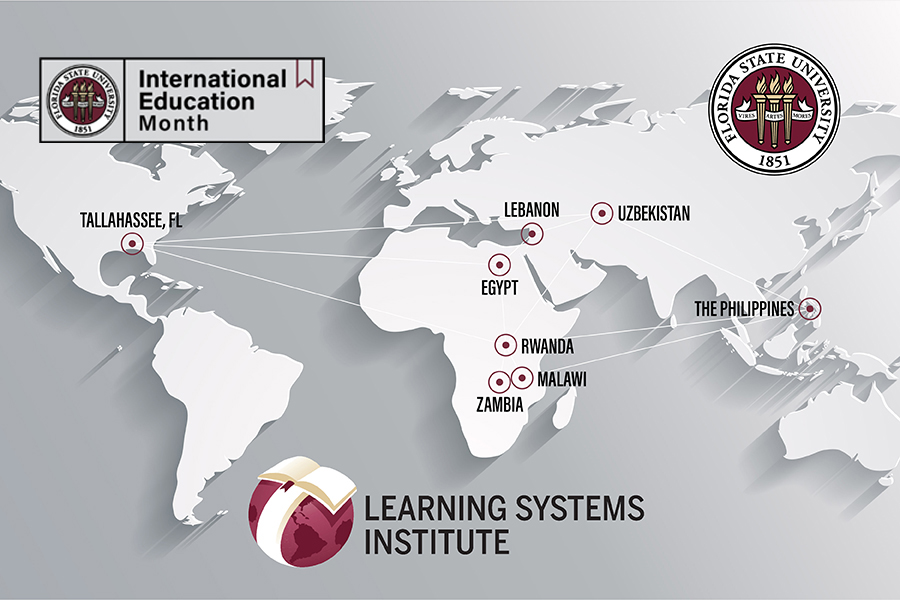
A Florida State University research center is making an impact on education across the planet.
Faculty at the Learning Systems Institute, or LSI, have worked with 44 countries during the center’s 53-year history, helping to train educators in all manner of academic subjects and at levels ranging from early childhood education to adult learners.
“By helping to develop and improve learning systems, LSI’s work is improving the lives of millions of people,” said LSI Director Rabieh Razzouk. “Teaching is crucial for the development of countries and of people, and our faculty and staff are experts at working to help innovate learning systems wherever they are.”
LSI has established itself as a world-leading institute for developing and implementing innovative learning solutions. It has received more than $750 million in grants and awards for its work, evidence of the trust the institute has earned from educators, governments and organizations around the world.
The center’s work continues in seven foreign countries this year: Egypt, Lebanon, Malawi, the Philippines, Rwanda, Uzbekistan and Zambia.
Egypt
One of LSI’s newest projects is taking place in Egypt, where faculty are working with FSU’s School of Teacher Education and the nonprofit Education Development Center to implement an initiative focused on interdisciplinary mathematics and English teaching.
The work is part of the Egyptian government’s Education 2.0 program, which aims to transform the country’s education system by emphasizing skills-based learning and expanding digital learning.
“This project is a unique opportunity for LSI to partner with FSU’s School of Teacher Education to implement this critical work that will reach all Egyptian children,” Razzouk said. “Working on the Teacher Excellence Initiative ensures Florida State University will play a vital role in Egypt’s Education 2.0 reform over the next five years.”
Lebanon
Along with sending faculty abroad, LSI also hosts visiting scholars. The center is continuing its partnership with the USAID/Lebanon Higher Education Capacity Development Program by welcoming 19 university staff members from Lebanon to Tallahassee.
The group spent five days focusing on career development programs, with much of the program hosted by The Career Center at FSU. LSI has also provided training to administrators and faculty in 10 Lebanese universities participating in the program. Training and support were provided on the topics of career center establishment, grant proposal writing, infrastructure setup and design thinking.
Malawi
LSI faculty are helping thousands of teachers and students through two projects in Malawi.
“We will be impacting every single teacher that teaches primary school in all of Malawi, which means that we will impact every child,” said Adrienne Barnes-Story, project director and LSI research faculty member. “It’s just mind-blowing that we can impact the entire primary education system while strengthening the higher education network of institutions necessary to carry this work forward.”
The Strengthening Teacher Education and Practice activity is based in Lilongwe, Malawi. Faculty have conducted needs analyses for universities, implemented professional development programs for six primary schools and presented their findings to national stakeholders.
A second project, in conjunction with the Malawi Institute of Education, developed new teacher guides and learner books for language arts in both English and the native Chichewa language. Those books were used for grades five and six in primary schools across the country.
The Philippines
LSI is continuing to support faculty from Bicol University and West Visayas State University as part of its partnership with USAID-Advancing Basic Education in the Philippines. Using a model jointly developed with Filipino faculty, the FSU team trained more than 150 undergraduate students in a course focused on teaching young students to read.
Rwanda
In Kigali, Rwanda, members of the LSI international team supported a project to teach literary-skills development to 70 instructors across the country. The team then conducted assessments to develop and deliver the first two weeks of a foundational literacy course to approximately 50 tutors in teacher training colleges.
Uzbekistan
The Uzbekistan Education for Excellence Program aims to improve skills in Uzbek language arts, mathematics, information and communication technology, and English as a foreign language in public schools. The LSI team developed the standards for language arts and math, and it developed standards, scope and sequence and customized textbooks and teacher’s guides for English as a foreign language. In addition, LSI led the development of a digital platform that will house all the curriculum standards and curricular materials, including textbooks and supplemental resources, to be used by all 300,000 teachers in Uzbekistan — a one-stop shop for all their curriculum needs.
Zambia
In Zambia, LSI supported a variety of projects in the USAID Transforming Teacher Education Program. In 2022, LSI developed a literacy course for educators, drafted six new language and literacy modules for use in Zambian colleges and completed research projects in the country. The institute also supported six Zambian lecturers who participated in residencies and two Zambian lecturers studying in master’s degree programs at Florida State.
“This project is exciting, as FSU has a lead role in improving primary teacher education at a national level,” said Stephanie Simmons Zuilkowski, an LSI associate professor and the project’s principal investigator.
Other Projects
LSI has additional ongoing work in Egypt and The Philippines to improve international understanding of U.S. community colleges and U.S. community college systems. LSI has worked on the Community College Administrator Program with the U.S. State Department and Santa Fe College since 2013.




